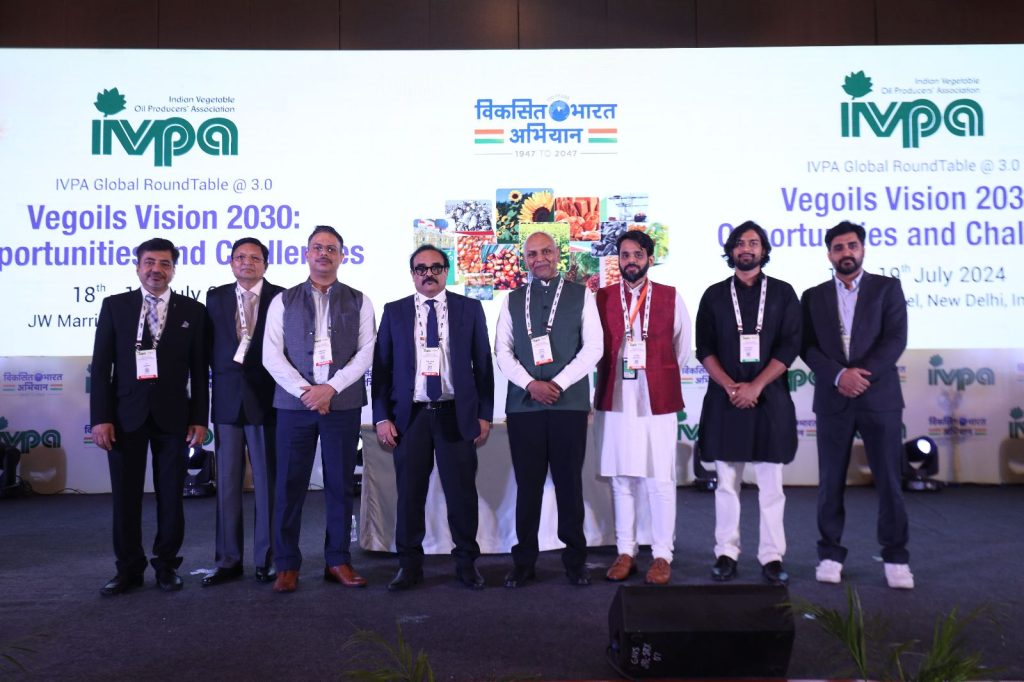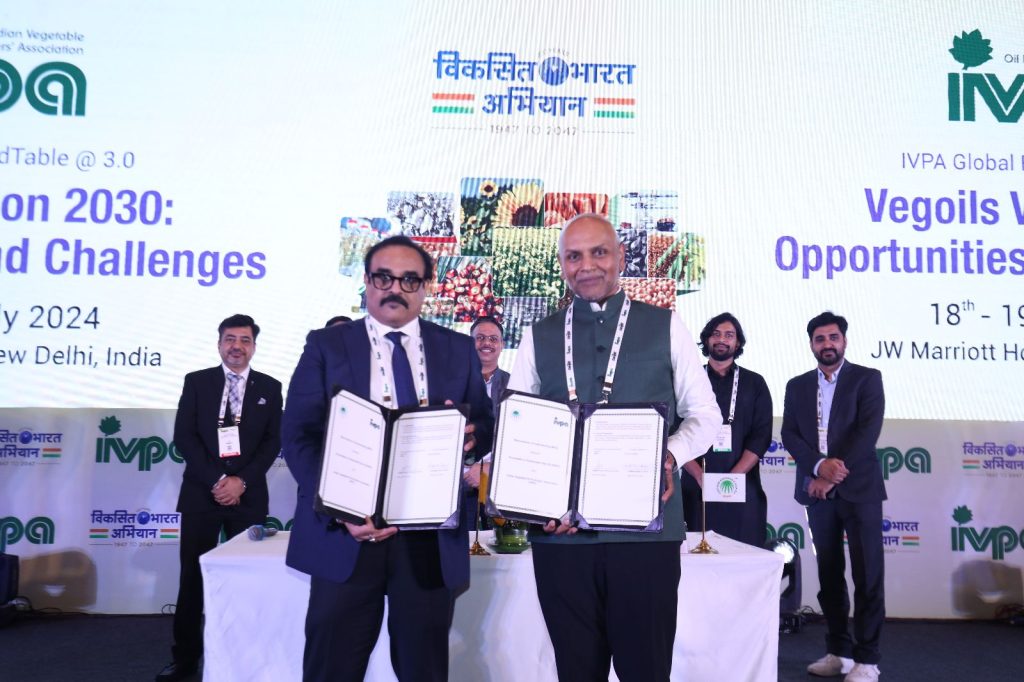
Memorandum of Understanding (MOU) between RSPO and IVPA signed during the annual flagship event of Indian vegetable oil producers to raise awareness, promote sustainable practices and advocate for supportive policies in India’s palm oil industry.
New Delhi, 19 July 2024: The Roundtable on Sustainable Palm Oil (RSPO) and the Indian Vegetable Oil Producers’ Association (IVPA) signed a Memorandum of Understanding recognising the importance of promoting sustainable cultivation and imports of palm oil in India, agreeing to collaborate in raising awareness, promoting sustainable practices, conducting research, and advocating for supportive policies in the palm oil industry.
The signing took place at the IVPA Global RoundTable @3.0, held in the JW Marriott, Aerocity, New Delhi on 18 July 2024. Carrying the theme, ‘Vegoils Vision 2030: Opportunities and Challenges’, the flagship event of IVPA gathered industry stakeholders, edible oil experts, government actors and key players to discuss the current market dynamics and trends of the edible oil market and supply and demand forecasts, diving into the critical issues of achieving self-sufficiency and sustainability in the vegetable oil sector.
Joseph D’Cruz, RSPO CEO, highlighted India’s emerging leadership as one of the frontiers of sustainable palm oil production in the Asian region, noting its dynamic growth over recent years: “Palm oil is a staple in the Indian market that plays a vital role in the country’s food basket. This gives India a unique opportunity to lead the charge in transforming the global palm oil production system and integrate sustainable practices, especially at a critical time when there is an urgent need to shift our food systems while ensuring food security and decent livelihoods of the people and communities that produce our food.”
IVPA President, Sudhakar Rao Desai, expressed, “This new agreement marks a new chapter of synergy between IVPA and RSPO in ensuring that sustainability is at the core of palm oil production and consumption in India. Our journey towards self-reliance through the implementation of NMEO-OP must be anchored by sustainability principles to mitigate any potential negative impacts and leverage opportunities to support Indian farmers in adopting sustainable practices. We look forward to strengthening our engagement and partnership with RSPO in building a robust, inclusive and resilient palm oil industry.”

As a partner of the IVPA Global Roundtable, RSPO hosted a session focused on addressing sustainability risks in oil palm cultivation, making a strong call for responsible sourcing of palm oil. Additionally, RSPO participated in the workshop, ‘Integrating Sustainability in Food System Transformation’, which deliberated on integrating environmental sustainability in food systems to meet the growing needs of a sizable population.
Speaking at the event, Dheeraj Talreja, AAK President, India, South Asia and Sub-Saharan Africa, explored the multiple pathways towards more sustainable food systems, saying “Food security is a critical issue in India, with a vast population of over 1.4 billion people. Despite making important strides in agricultural production, a key challenge we face in ensuring food security and sustainability is addressing the significantly high emissions rate of our current food systems and food practices, calling us to strengthen collaborative efforts towards net zero.” He made the business case for sustainability, highlighting the growing trend among younger consumers who place a high value on sustainable products and green labelling, and underscoring the need to stimulate heightened interest from investors in green businesses.”
Towards self-sufficiency
As the world’s largest importer of palm oil, amounting to 9 million tonnes annually, and one of the largest consumers of palm oil globally, India holds a significant influence over the dynamics of the palm oil industry. In 2022, India surpassed China as the country with the world’s largest population, with over 1.44 billion people.
Since 2021, the country has made significant strides towards reducing its dependence on edible oil imports by bolstering palm oil production, aiming to produce as much as 3 million tonnes of palm oil by 2030 with the launch of the National Mission on Edible Oils – Oil Palm (NMEO-OP) to accelerate production and help increase farmer incomes by incentivising palm oil. India aims to increase production of oil palm to 1.12 million tonnes across 1 million hectares by 2025–26, and to 2.8 million tonnes across 6.6 million hectares by 2030.
A recent study commissioned by RSPO and conducted by Sattva Consulting mapping the current farming practices across Assam and Andhra Pradesh shows significant differences in the awareness, adoption of best practices and yields across both these states. This study provides the foundation for the industry, stakeholders and policy makers to work together to increase awareness on good agricultural practices, cross learnings between farmers in these states and policy measures that can be adopted for a successful implementation of NMEO-OP in a sustainable manner.
Against this backdrop, India is in a unique position to become a role model of sustainable palm oil production in the Asian region, strengthening its advocacy for food system transformation and mobilising the global community towards realising the Sustainable Development Goals. Over the past 12 months, RSPO membership in India has increased by 20%, reflecting a growing commitment to sustainable practices within the palm oil industry.
This surge in membership to 118 Indian entities underscores the dedication of Indian companies and stakeholders to environmental sustainability, ethical sourcing, and responsible production. RSPO remains committed to supporting its members with the resources and guidance needed to adhere to globally recognised sustainability standards.
About RSPO:
The Roundtable on Sustainable Palm Oil (RSPO) is a global partnership to make palm oil sustainable. Formed in 2004, the RSPO is a multi-stakeholder non-profit organisation that unites members from across the palm oil value chain, including oil palm producers, palm oil processors and traders, consumer goods manufacturers, retailers, banks and investors, environmental or nature conservation non-governmental organisations (NGOs), and social or developmental NGOs.
As a partnership for progress and positive impact, the RSPO facilitates global change to make the production and consumption of palm oil sustainable. To inspire change, we communicate the environmental and social benefits. To make progress, we catalyse collaboration. To provide assurance, we set the standards of certification.
The RSPO is registered as an international association in Zurich, Switzerland, with main offices in Malaysia and Indonesia, and offices in China, Colombia, Netherlands, United Kingdom and the United States.
For further information, kindly contact: [email protected].
Keep reading

Book Your Slot for the Additional prisma Clinic Session at RT2025

Advancing Jurisdictional Certification in Sabah: Strengthening Collaboration Between RSPO, UNDP, and Jurisdictional Approach System for Palm Oil (JASPO)
Call for Expression of Interest: Independent Investigation of a Complaint

Leading Labels: RSPO Among Top Sustainability Labels in Dutch Market

The 21st International Oil Palm Conference Successfully Took Place in Cartagena, Colombia

Top Performers of the 2025 Shared Responsibility Scorecard

ACOP 2024: RSPO Market Trends Resilient Despite Global Challenges

RSPO: Actions for the Certification of Sustainable Palm Oil Production




